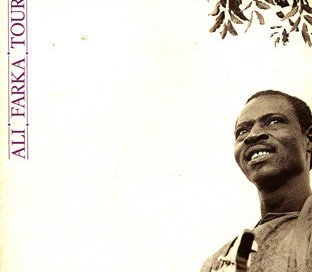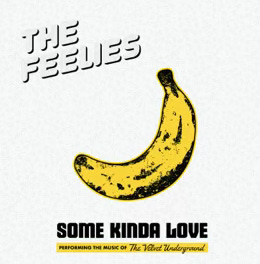Listen to Tim Riley’s narration:
Ali Farka Touré (Magno, 1988)
The master guitarist Ali Farka Touré died in 2006 at 67, widely praised for developing an “African desert blues,” woven from his Malian roots. This Earthworks domestic debut rode the Graceland world music wave alongside Salif Keita. He probably made his highest-profile album with Talking Timbuktu in 1994 with Ry Cooder. This US debut lingers with more meditative swagger, and when this ran in the Boston Phoenix in 1989, I chanced upon him at the Jazz & Heritage Festival in New Orleans. The music’s intimacy cast a surreal spell. He would have turned 83 on October 31.
THE STANDARD LINE on Mali guitarist, singer, and songwriter Ali Farka Touré is that his polyphonic fingers and reedy yet heartfelt singing provide a transatlantic link between the Mississippi Delta blues and its West African ancestry. But that notion is too pat for his US debut, Ali Farka Touré. Indeed, his work has as much to do with the well-developed storytelling griot-singer tradition of his country as with any American form. Touré has been recording—in several languages—since the mid-70s. With subtly chiseled cross-rhythms buoying sing-songy harmonies (he plays both original and traditional tunes), his good-natured manner makes him a prospect for crossover world-music stardom. And his manicured guitar voicing—setting three melodic lines in motion at once—put him in a virtuoso league with pickers like Chet Atkins.
Toure's rhythms not only work through odd meters (3/8, 5/8), but they also twitch standard 4/4 and 12/8 patterns beyond recognition. Inner, subterranean rhythmic sequences nudge longer pulses across bars, and the accents of his overdubbed calabash (a percussion instrument that resembles an overturned wooden salad bowl) repeatedly thwart your expectations. To tap Touré's rhythms out on a table requires poly-rhythmic concentration—one hand tapping one rhythm, the other tapping another. "Singya" (a Malinke word that means "the mother's milk") sets triplets rubbing up and down against duples, turning an irregular 6/8 meter into an Escher-like rhythmic maze.
Plenty of these tunes have a high-spirited lilt (like "Bakoytereye," or "Just say no" in “Songhai”), but the overriding tone of all this rhythmic activity is pacific, almost serene. There's a stillness at the center of this music that emanates from the precise intersection of the lines—it suggests the way a wheel's spokes can appear to be at rest while spinning freely. And for all his geometric fluidity and control, Touré sounds beatifically relaxed as though he were lofting these patterns effortlessly—you can almost hear him smile through his playing.
If stateside blues is often tragic and inward (desire and happiness thwarted by ignoble forces), Ali Farka Touré's themes are alternatively reflective and joyous rather than boisterous or defiant. The album's centerpiece is a nine-and-a-half-minute meditation entitled "Amandrai Live," which was recorded at London's Crossing the Border Festival in 1987. (The CD features two extra tracks, one a percussion-less studio take of "Amandrai.")
Sung in Tamashek and accompanied by Toumani Diabaté on calabash, "Amanda Live" is a long song directed toward the singer's little sister and built on a blues-like ostinato beneath lead lines (much in Delta style); and it sounds as sad and introspective as it does reconciled. Touré isn't confronting ignoble forces or inner demons. He's exploring emotional puzzles: the song's narrator lies awake at night brooding about his feelings for a woman he knows he shouldn't desire. (It's unclear whether the term "sister" is meant literally.) What Touré delves into is a private cogitation where agape is vexed by eros. It's what the blues might sound like without the wide-ranging anger or the tension between the sexes as we understand it over here.
clear skies for the grey lady
So, former Guardian Alan Rusbridger reviews Nagourney’s new New York Times history during the Trump years without mentioning Hillary? By allowing Nagourney’s reference to Judith Miller (“a bulldozer of a reporter”) to pass unremarked? (That term “bulldozer,” often used as a blanket compliment among journalists, now rings out with radioactive ironies.) But what editor let him conclude that we’ve all arrived at a “broadly happy ending”? What paper has he been reading?
Right next to that one in the same issue of the Book Review, A.O. Scott covers Michael Wolff on Murdoch:
Wolff knows what you might be thinking: “Yes, yes,” he acknowledges, “here is quite a bit of the raw inspiration for ‘Succession,’ that roman à clef soap opera about you-know-who and his family and their empire.” But despite the obvious parallels between the Roys and the Murdochs, Wolff offers “The Fall” as “a TV newsroom sitcom” rather than a family tragedy. A gritty reboot of “The Mary Tyler Moore Show,” you might say.
But a sharp editor might have caught this detail from Murdoch’s public divorce settlement with Jerry Hall, the type of juicy detail that might yet get me to watch it.
quote of the month
From Taffy Brodesser-Akner, in the New York Times Magazine, on attending Taylor Swift’s Era tour, delivers this without sounding the least bit patronizing: “The mood was solemn—spiritual, even. I have prayed at dawn at the Temple Mount. I have stood among quivering supplicants at the graves of biblical forefathers. I have walked in trembling silence as I entered farther and farther into the inner sanctums of the Vatican. This was like that, except for girls.”
album of the month
The Feelies, Some Kinda Love: Performing the Music of the Velvet Underground (Bar None)
on deck
We Were Famous, You Don't Remember: The Embarrassment screens again at WFMU's space in Jersey City, Monty Hall, on Sunday, November 12th at 7 p.m. See the report’s coverage here (“Some of this goes against the music's caterwauling grain, and only accents the band's freefall strangeness; on the other hand, it's impossible to imagine how this content might guide a better form…”)
Reviews: Pledging My Time, by Ray Padgett for the LA Review of Books; Maestro, Bradley Cooper’s Leonard Bernstein biopic with Carey Mulligan; Taylor Swift breaks more records; and year-end lists
noises off
Dadcore Breakup Playlists and soon more are now on TikTok
substack archive, riley rock index: obits, bylines, youtube finds, reference sites, pinterest, beacons.ai, random deep link






Taffy Brodesser-Akner is a fine stylist with one topic of expertise: Taffy B-A. She writes as if she believes that Taylor Swift should be taking notes about what it's like to be Taffy attending a Taylor Swift show.